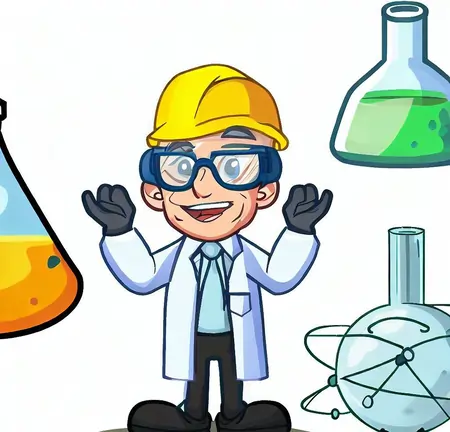More than just technical know-how and subject-matter expertise is needed to succeed in chemical engineering assignments. Have you ever questioned how those elusive students who consistently rank at the top of their classes do it? What techniques do they use to master difficult ideas, work out challenging issues, and communicate their ideas?
We will reveal the class toppers' secret methods and strategies in this blog, which set them apart from their contemporaries. We will examine the tried-and-true techniques that enable these top students to succeed in their chemical engineering assignments, from meticulous planning to effective time management, from in-depth research to structured writing.
Assignments in chemical engineering require a special synthesis of theoretical knowledge, real-world application, and analytical thought. It is crucial to have the ability to solve difficult equations, carry out calculations, and make compelling arguments. However, the extra abilities, routines, and methods that top students adopt are what set them apart.

This blog will give you invaluable insights and practical advice to improve your performance on chemical engineering assignments, whether you're a struggling student looking to raise your grades or an aspirant class topper seeking further development. Prepare to discover the keys to academic success and plow the path to excellence in this difficult field.
Knowing the purpose of chemical engineering
Let's first explore the field of chemical engineering. This field, which straddles the boundaries of physics, chemistry, and biology, presents problems and opportunities that are peculiar to it. With a wide variety of sub-disciplines and specialty areas, this field of study is both extraordinarily diverse and extraordinarily complex. Chemical engineering encompasses a wide range of activities, including cutting-edge research in biotechnology and environmental engineering, as well as the design of large-scale processes to produce and transform chemicals, raw materials, living cells, and energy into useful forms and products. Although its main draw, chemical engineering's complexity can also prove to be a challenging obstacle for many students. Here, knowing how the best students handle their workload, learn efficiently, and ace their assignments, becomes extremely useful.
Systematic learning is a key strategy used by class leaders. Numerous topics are covered in chemical engineering, and each one is important and has a specific place in the overall curriculum. By going through each topic in a structured and organized way, systematic learning ensures that the knowledge is acquired and retained for later use. It necessitates creating a balanced study schedule and giving priority to important topics that serve as the course's cornerstone. This doesn't imply rushing through the curriculum, but rather a methodical process of understanding and careful attention to detail.
Class leaders recognize the value of connecting new knowledge to prior knowledge. If something is related to an established concept, it is simpler to remember it. In chemical engineering, this might entail comparing a novel chemical process to a well-known one or comprehending a novel equation in terms of a well-known equation.
Developing Problem-Solving Skills
The core of chemical engineering is problem-solving. Problem-solving abilities are essential when creating processes or working on chemical reactions. Class leaders frequently use a methodical approach to problem-solving that entails the comprehension of the issue, identification of the knowns and unknowns, choice of the proper equations or theories, computations, and verification of the solution.
Keep in mind that a solution in chemical engineering is more than just a result. It must make sense in light of the issue at hand. Top students frequently use a "sanity check" strategy to determine whether or not their solution is feasible. This calls for having a conceptual understanding of the issue at hand as well as an idea of what a justifiable solution might entail.
The integration of theoretical knowledge with practical application is one of the tricks that A students swear by. Understanding concepts is only one aspect of chemical engineering; applying them to practical situations is another. The top students frequently participate in laboratory exercises, internships, research projects, or practical assignments that give them the chance to apply what they learn in the classroom to real-world issues.
They also recognize the value of applying theoretical concepts in real-world situations. A chemical reaction that you learned about in theory might not seem important until you see the outcome of the experiment. Top performers use this practical experience to remember and comprehend difficult ideas and concepts, improving their capacity to handle various tasks and questions.
The Value of Continuous Evaluation and The Function of Networking
Class leaders identify their strengths and weaknesses before the end of the term or semester. They participate in continuous assessment, which entails reviewing previously covered material regularly, taking self-tests, and resolving questions from prior years. This practice not only enables them to evaluate their comprehension and learning but also to pinpoint areas that need improvement.
They make sure they comprehend any errors they may have made by reviewing old assignments and tests. An essential component of learning is comprehending why something was incorrect and how to fix it. They can be well-prepared for any question or issue that may arise thanks to this ongoing assessment.
The ability of class leaders to work together and network is a crucial component of their success. Chemical engineering is a broad field that calls for both a strong understanding of oneself and the capacity to collaborate well with others. Toppers frequently participate in study groups where they can exchange concepts, tackle challenging subjects, and pick each other's brains. Additionally, they develop relationships with professors and teaching assistants who can offer helpful advice and resources.
Integrated Education and Development
Finally, students who excel in class go beyond what is taught in the textbooks. They frequently keep up with the most recent advancements in the field by reading research papers, participating in forums and discussions, attending seminars, and following industry trends. They gain a broader perspective and understanding of chemical engineering thanks to this holistic learning approach, which better prepares them to handle challenging assignments and get better grades.
Their focus on research is an important characteristic of top students. Top performers are aware that merely consulting textbooks is insufficient to achieve success on chemical engineering assignments. Although textbooks may cover the fundamentals, it's critical to keep up with the most recent findings and developments because the field of chemical engineering is constantly changing. To achieve this, you must read academic articles, go over case studies, comprehend how various chemical engineering principles are applied in various industries, and incorporate your findings into your assignments.
Finding new information is important, but so is figuring out which information is trustworthy. You can understand and assess new information better if you have a solid foundation in the fundamentals. Class leaders frequently develop the habit of consulting multiple sources, which enables them to present well-rounded, thorough responses that stand out from the competition.
Using Time Management Techniques
Effective time management is crucial when discussing the success strategies of high-scoring students. These top students are typically skilled at planning their study time wisely. Chemical engineering coursework is comprehensive and demanding, necessitating a disciplined and organized approach that starts with effective time management.
Class leaders typically adhere to a consistent study schedule that maintains a balance between various subjects, assignments, revision sessions, and downtime. They rank tasks according to importance, difficulty, and deadlines. Setting reasonable goals for each study session, taking regular breaks to prevent burnout, and utilizing time-saving techniques like focused study and the use of study aids are all part of effective time management. Adopting effective time management techniques can boost productivity, lower stress, and improve all aspects of your academic performance.
Conceptual understanding is prioritized and Making Use of the Resources at Hand
The study of fundamental ideas is a prerequisite for the field of chemical engineering. Top students put more emphasis on ensuring a thorough rather than a cursory understanding of these fundamental ideas. Understanding the complexities of chemical engineering problems would not be made possible by mere memorization of facts or formulas.
The "why" and "how" behind each concept is emphasized by top students, enabling them to solve a wider range of problems using the same basic knowledge. They take the time to thoroughly comprehend the fundamental ideas, ideas, and procedures. Their conceptual understanding enables them to deconstruct complex problems and approach them methodically, applying concepts logically and precisely.
Making the most of all available resources is another crucial tactic used by class leaders. This includes notes from lectures, books, websites, libraries, experiments in the lab, and more. The digital world of today provides a wide range of resources, including educational platforms, online study groups, digital libraries, and much more. These resources are used by them not only to comprehend the concepts but also to practice and gauge their comprehension.
For instance, interactive simulations are frequently available on online platforms, which can make complex chemical processes easier to understand. High-achieving chemical engineering students typically take advantage of office hours with their professors by clarifying their questions and bringing up difficult subjects.
Building Critical Thinking and Analysis Skills
Critical and analytical thinking skills are crucial in the field of chemical engineering. The ability to analyze issues from a variety of perspectives, recognize potential solutions, and draw conclusions from their analysis is a critical thinking skill that top students frequently possess.
Understanding the effects of changing conditions on a chemical process, assessing the effectiveness of a process, or troubleshooting a problem in a chemical plant are all examples of critical thinking in chemical engineering. Through practice and experience, these abilities grow over time. Finding the right response is important, but so is comprehending how you arrived at it.
Peer-to-Peer Learning Activities
Peer-to-peer learning is the final but not the least technique used by top students. Increased concept understanding through discussion, exposure to various viewpoints, enhanced communication skills, and a sense of academic community are just a few advantages of this type of learning.
Peer-to-Peer learning can occur in a variety of settings, including study groups, online forums, and even casual conversations. It has been demonstrated that cooperative learning like this improves knowledge retention, application, and comprehension. Class leaders frequently take the lead in these study groups, assisting not only their peers but also themselves in better understanding difficult concepts.
Conclusion:
High grades on chemical engineering assignments are not an improbable goal that can only be attained by a select few. You can improve your performance and achieve academic success by putting the strategies and techniques used by the class toppers.
The tips shared in this blog serve as a success road map and cover everything from efficient time management to in-depth research to structured writing and attention to detail. You can improve your comprehension of complex concepts, hone your problem-solving abilities, and present your work with precision and clarity by implementing these practices.
Remember that completing chemical engineering assignments successfully requires a combination of discipline, perseverance, and shrewd study techniques rather than just natural talent. Accept these insights, implement them into your process, and watch your academic performance soar. You have the potential to excel in your class and open up a world of opportunities in the field of chemical engineering if you are persistent and take the right approach.
